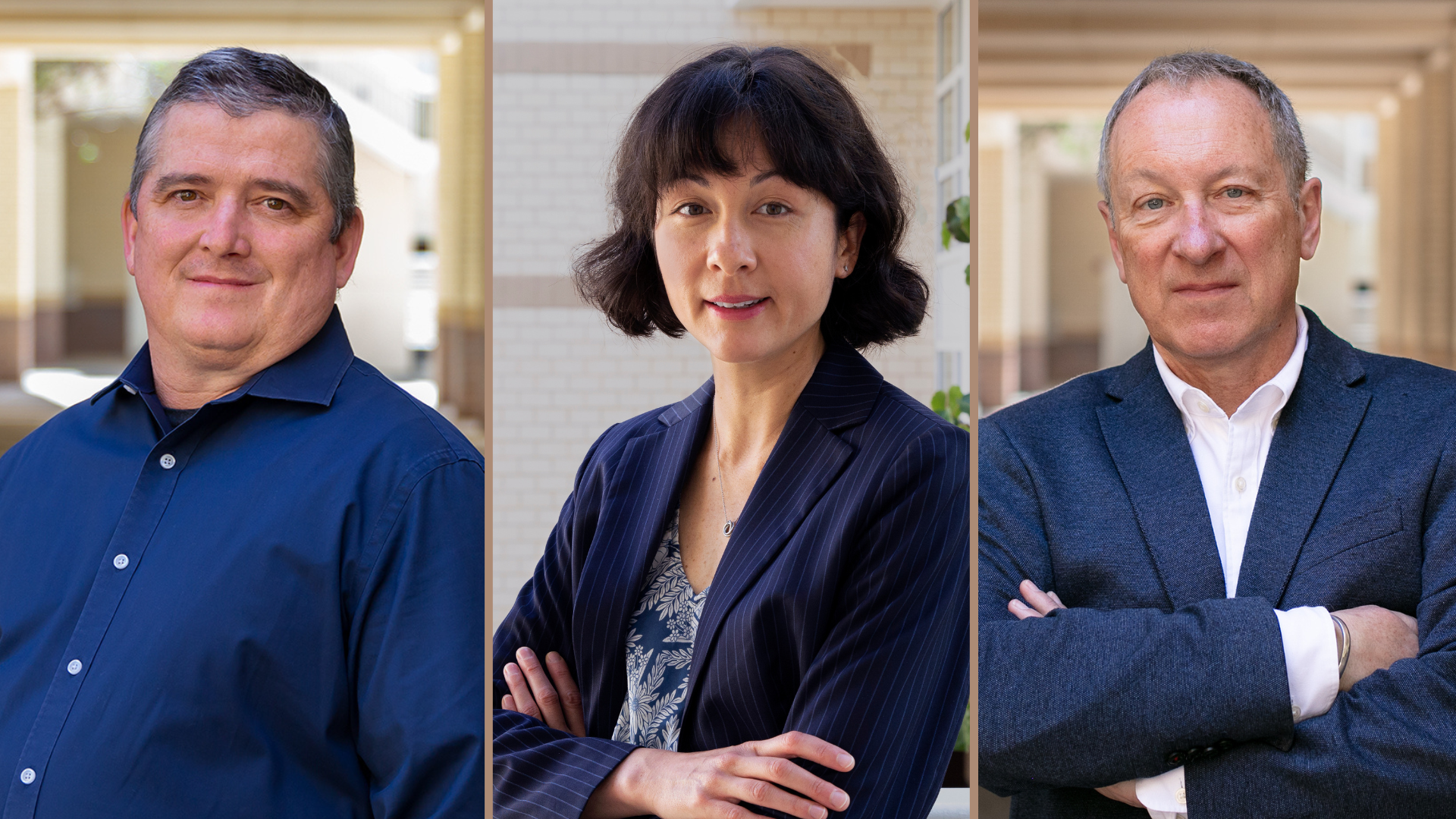
From left: Doug Houston, Jessica Garrison and Richard Matthew
Awards emphasize collaborative solutions-driven research
Three urban planning and public policy professors are part of the UC Irvine Climate Collaboration’s inaugural team project grant recipients for 2025-26.
Eighteen submissions with faculty participation spanning 15 schools and 21 academic departments were subjected to an interdisciplinary review process before five research teams were selected for Climate Collaboration grants, according to director and Chancellor’s Professor of civil and environmental engineering Brett Sanders, who is also part of the Urban Planning and Public Policy Department faculty by courtesy.
“Through these projects, we aim to showcase UC Irvine’s capacity for team-based, solutions-driven research while fostering exciting new learning opportunities for students,” Sanders says.
One project, Wildfire Intelligence for National Security, is led by Amir AghaKouchak, Chancellor’s Professor of civil and environmental engineering, whose team includes Richard Matthew, professor of urban planning and public policy and director of the Climate and Urban Sustainability Program (CUSP) and senior fellow with the International Institute for Sustainable Development in Geneva.
They are part of a large interdisciplinary team that is exploring how wildfire behavior can be better understood and anticipated through artificial intelligence, real-time satellite observations and predictive modeling. In collaboration with government agencies such as the U.S. Forest Service and emergency management partners, the team seeks to inform disaster preparedness and resilience planning.
“It is modeling wildfire threats, which, as we know, are getting more and more relevant to Southern California, more and more dangerous,” Matthew explains. “We will be able to model this complex hazard with the same sort of authority that we currently do modeling flood hazards. This is very exciting because, right now, we tend to be caught off guard when a big catastrophic wildfire takes place. We know they are linked to the Santa Ana winds, we know they are linked to rainfall, but it’s not easy to model them and predict the damage they are going to do.”
Asked about his role on AghaKouchak’s team, Matthew replied, “I’m bringing in sort of the interface with the policy world. How do we take a science and bring that scientific understanding? Because we know a lot about hazards like wildfire, but it’s not always easy to bring our knowledge into the right place where they can implement it in a way which that is useful to people. So, the idea is to improve our understanding of catastrophic wildfires and figure out how to bring that information to policymakers. It’s very exciting.”
Other members of his team are: Tirtha Banerjee, associate professor of civil and environmental engineering; Ramin Bostanabad, associate professor of mechanical and aerospace engineering; Efi Foufoula-Georgiou, Distinguished Professor and Henry Samueli Chair in engineering and civil and environmental engineering; Mohsen Imani, associate professor of computer science; Phil Nguyen, associate adjunct professor of civil and environmental engineering; Christopher Olivares, assistant professor of civil and environmental engineering; Mohammad Qomi, associate professor of civil and environmental engineering; and James Randerson, Ralph J. and Carol M. Cicerone Professor of Earth system science.
Matthew’s urban planning and public policy and CUSP colleague Professor Doug Houston leads the Pocket Park and Garden Climate Solutions project that will investigate how small-scale green spaces, such as community gardens and pocket parks, influence neighborhood microclimates, air quality and public health.
"This project grew out of the amazing work that the University Hills Sustainability Committee is doing to convert an underutilized corner lot into a native plant garden," Houston explains. "Over the past year, our team conducted engagement activities to gather feedback from nearby residents about their suggestions and priorities for the design of this new native plant pocket park which will be installed in early 2026."
Over the same span of time, Houston also worked with postdoctoral colleague Vivianna Goh to survey the leaders of community produce gardens across California.
"We found gardens provided many benefits beyond healthy food," Houston says, "including skills building, physical and mental health, and expanded social connections. Findings support state efforts to expand support for community gardens to help reduce greenhouse gas emissions."
Besides Irvine, Pocket Park and Garden Climate Solutions project team will study, map and monitor green spaces in areas of Santa Ana and Southeast Los Angeles County.
"We will monitor the usage patterns and ecosystem services provided by pocket parks and gardens to document their benefits including flood mitigation, urban heat mitigation, support of biodiversity, and public health and educational amenities," Houston says. "We will also work with partners from neighborhood associations, city departments, garden associations, and local organizations to identify best practices in park planning based on their experiences planning, creating, and managing pocket parks and gardens."
His team includes Jessica Debats Garrison, urban planning and public policy assistant professor of teaching; Associate Professor of health, society and behavior Jason Douglas; and assistant researcher of civil and environmental engineering Monica Palta. "I am excited about collaborating with our campus and community partners to better understand the transformative role these small greenspaces can play in achieving multiple goals: reducing pollution, supporting public health, and mitigating the harmful impacts of climate change," Houston says.
Other Climate Collaboration projects are Building Resilience in California’s Desert Future; Detecting Early Vegetation Drought in California; and OC-FIRE Model: Localized Fire Risk Mapping for Orange County.
“I think it’s great,” Matthew said of the UC Irvine Climate Collaboration. “This is a huge university, and it has a lot of people doing interesting work, but it’s often hard to connect people together. And what this does is it says if you want to be funded by the Climate Collaborative, you must work with a bunch of different people from different schools and, really, for a lot of these problems, you need to add new understanding and make it relevant. You get people from public health and social ecology and engineering working together, gaining some experience together, so they can be productive and innovative.”
— Matt Coker